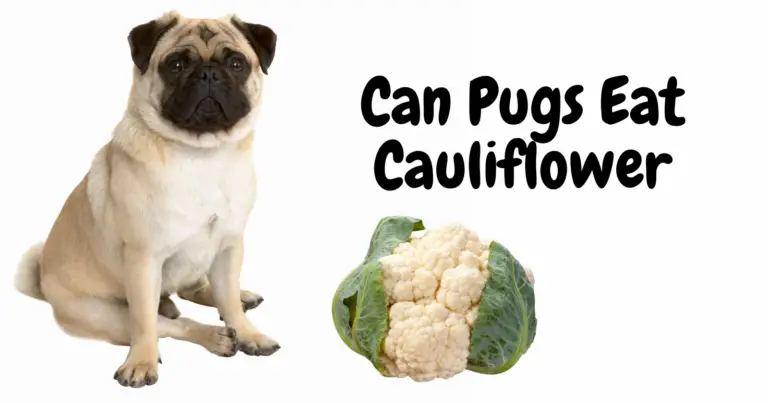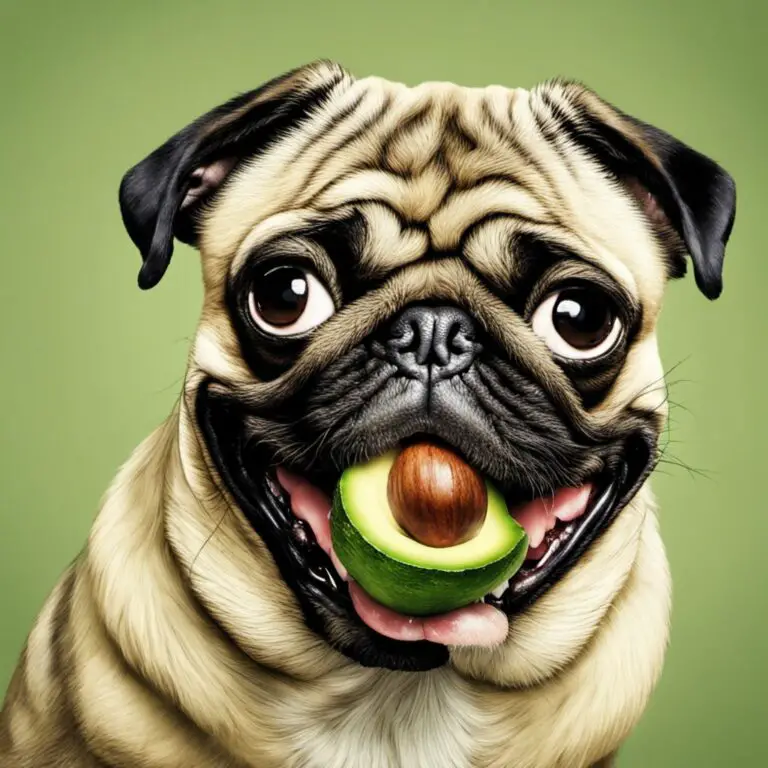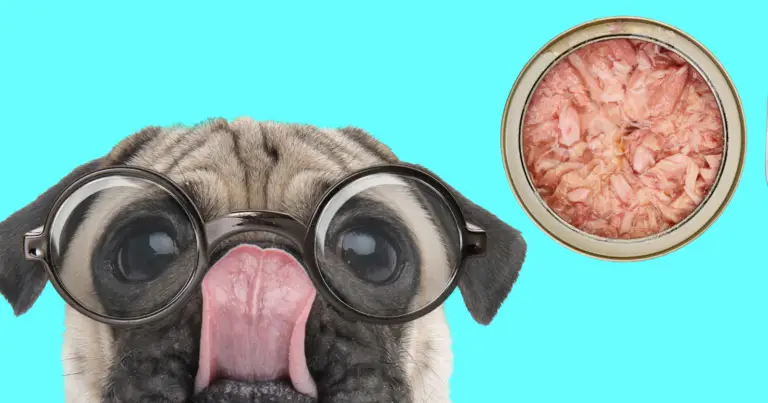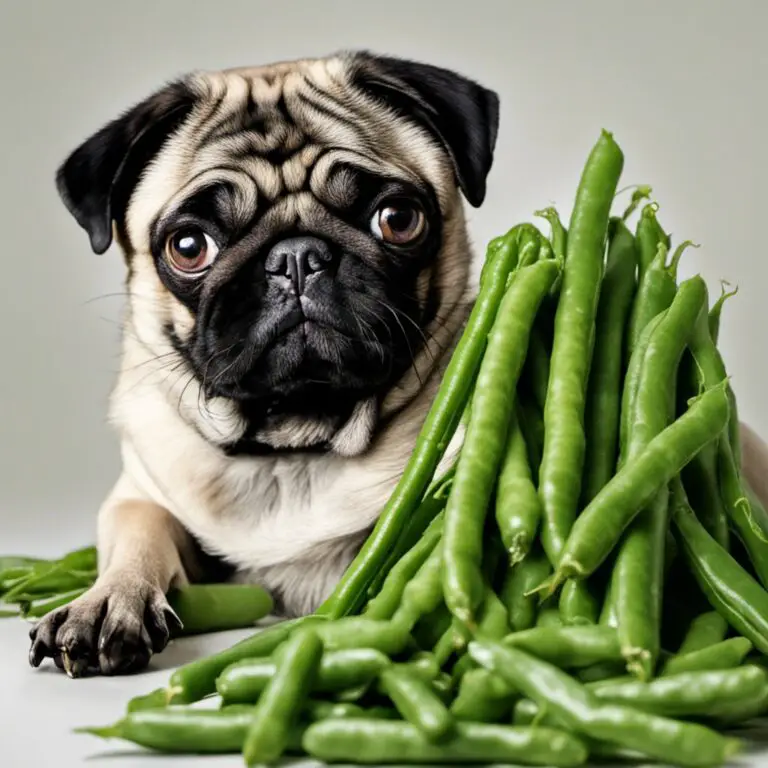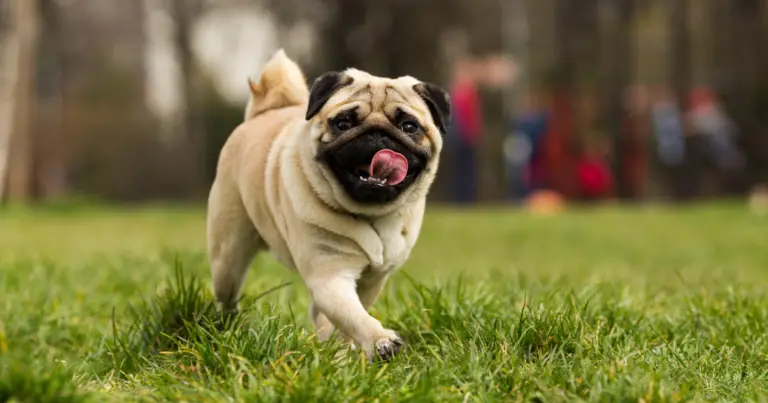Can Pugs Eat Fish? A Brief Expert Guide
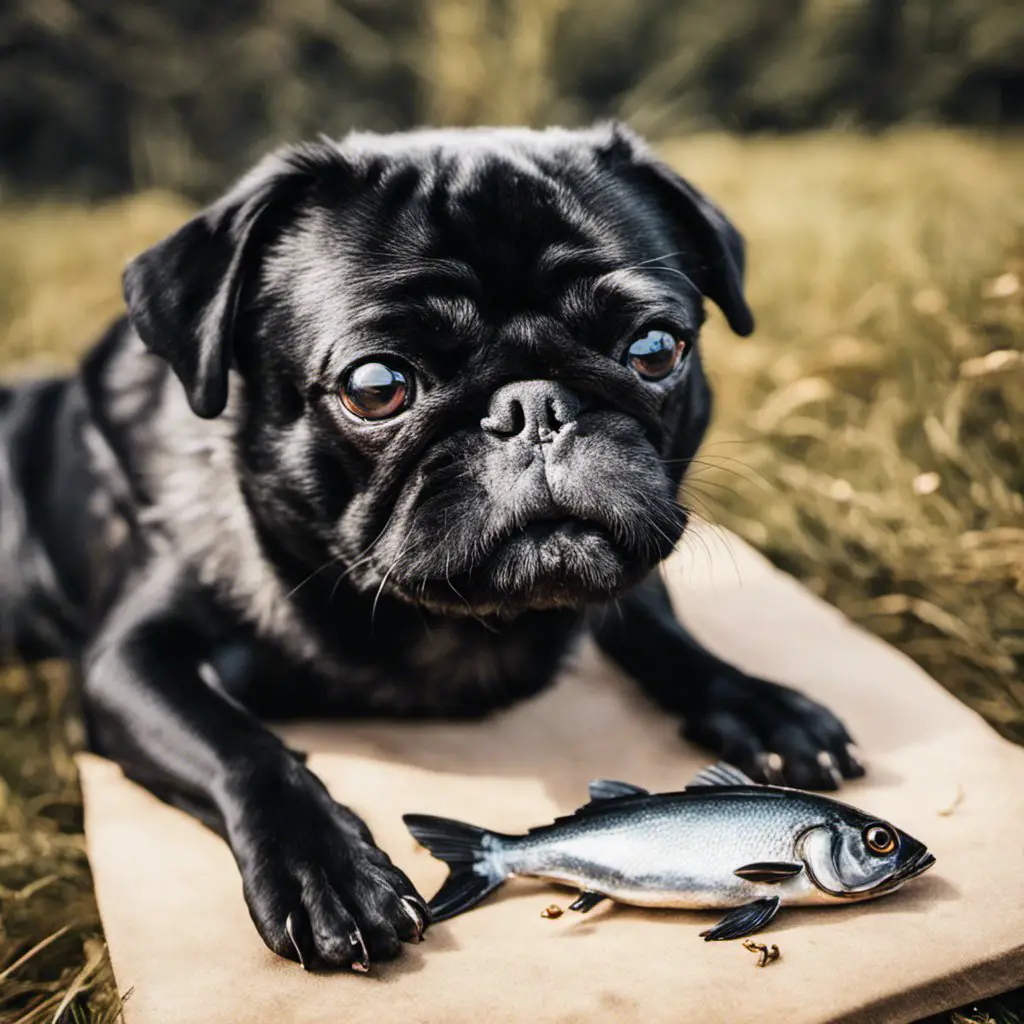
As a pug owner, knowing the types of food your furry friend can safely consume is essential. One common question is, “Can Pugs Eat Fish”. To address this query, it’s crucial to understand the nutritional benefits of fish and the optimal way to include it in a pug’s diet.
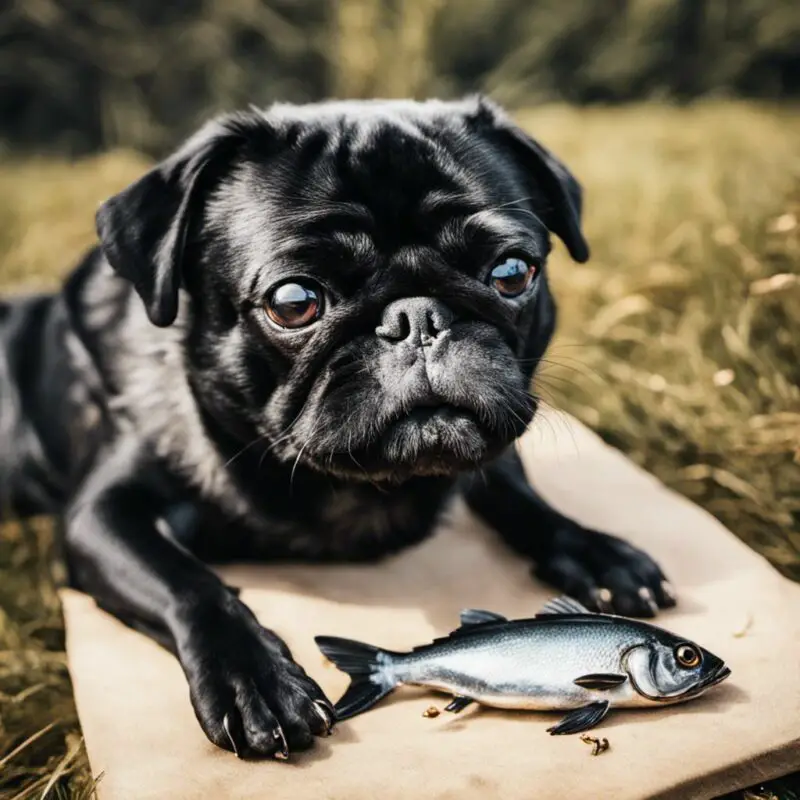
The answer is yes – pugs can eat fish, and it is actually good for them. Fish is an excellent source of protein and essential fatty acids, such as omega-3, which benefits a pug’s overall health. Shorter-lived fish species like salmon, walleye, trout, herring, flounder, whitefish, and Atlantic char are the most beneficial types to feed a dog.
However, it’s important to ensure the fish is well-cooked and bones-free, as these may pose a choking hazard or cause internal injuries.
Contents
Table of Contents
Pugs and Their Dietary Needs
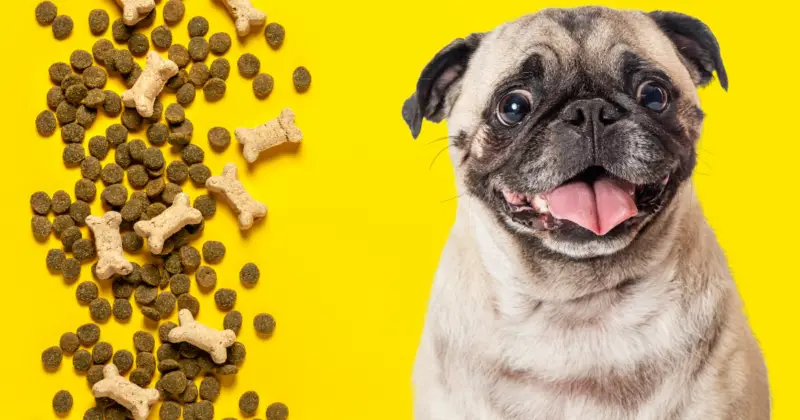
Pugs are known for their unique appearance and playful personality, making them a popular choice of pet for many people. Like any dog breed, pugs have specific dietary needs that should be met to ensure they maintain their health and vitality.
Get The Free Food Eating Guide That Keeps My Pug Happy and Playful Even at 13 Years Old
100% Beginner Friendly & Lists Real Foods Your Pug Can Actually Eat!

One essential part of a pug’s diet is providing a balance of proteins, carbohydrates, fats, vitamins, and minerals. This can be achieved through a diet consisting mainly of high-quality commercial dog food, such as Royal Canin Breed Health Nutrition Pug Dry Dog Food, which has been developed specifically for the nutritional needs of pugs aged 10 months and up.
In addition to their main meals, pugs can benefit from the occasional inclusion of healthy treats. Some fruits and vegetables can be a great addition to their diet, offering vitamins and fiber for an extra nutritional boost. For example, apples can provide vitamins A and C while being low in protein and fat, making them a perfect snack for senior pugs.
Fish can also be an excellent addition to a pug’s diet, as it provides a good source of protein, omega-3 fatty acids, and other essential nutrients. Shorter-lived species like salmon, walleye, trout, herring, flounder, whitefish, and Atlantic char are particularly beneficial for dogs as they are less likely to contain harmful contaminants.
When it comes to feeding your pug, it’s crucial to provide them with the right portion sizes and avoid overfeeding. Pugs are prone to obesity, which can lead to various health issues. Monitoring their food intake and ensuring they get adequate exercise can help keep your pug at a healthy weight.
To sum up, a balanced diet with a combination of commercial dog food, fresh fruits and vegetables, and occasional fish can meet the nutritional needs of pugs and help them thrive.
Can Pugs Eat Fish?
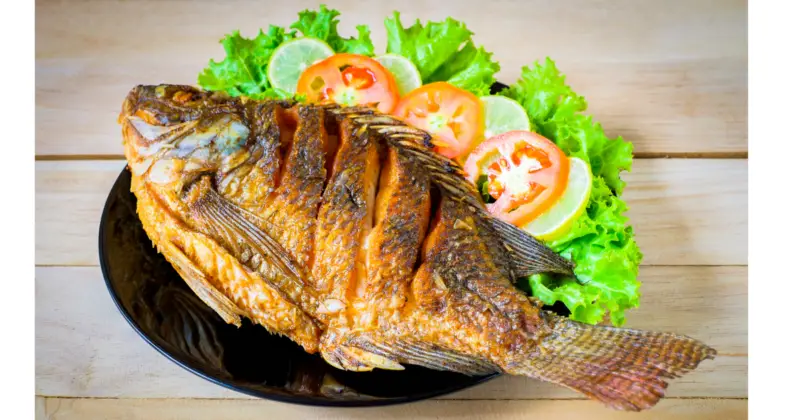
Yes, pugs can safely eat fish, and it is actually beneficial for them. Fish is a great source of protein and omega-3 fatty acids, supporting a healthy coat, reducing inflammation, and promoting a strong immune system. Feeding your pug shorter-lived species like salmon, walleye, trout, herring, flounder, whitefish, and Atlantic char are some of the most beneficial types for dogs.
However, when feeding fish to your pug, it is important to consider the preparation method. Fish cooked in too much oil can cause gastrointestinal upset in dogs or even lead to serious illnesses such as pancreatitis, as the American Kennel Club mentioned. It is best to provide your pug with fish that is cooked plainly, without added oils, seasonings, or sauces.
In addition to fish, pugs can also enjoy a variety of other safe foods, including certain fruits and vegetables. For instance, carrots are a nutritious, low-calorie snack that pugs can eat in moderation. They are rich in fiber and beta-carotene, which can support your dog’s overall health.
When feeding your pug fish or other foods, it’s important to remember that moderation is key. Maintaining a balanced diet specific to your pug’s nutritional needs is essential. Including fish alongside other safe and healthy foods will ensure your pug receives all the necessary nutrients to stay happy and healthy.
The Health Benefits of Fish for Pugs
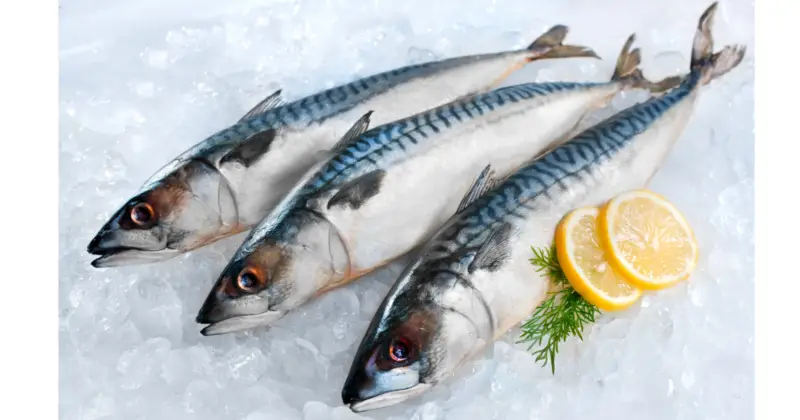
When properly prepared and served, fish can be a beneficial addition to your pug’s diet. It’s an excellent source of high-quality protein essential for maintaining your pug’s muscle strength and overall health. Protein in dog food should not exceed 22%, and crude fatty acids must account for around 5% in adult pugs and 8% in puppies’ food intake, according to this source.
One of fish’s most notable health benefits is their abundance of omega-3 fatty acids. These fatty acids are known to promote healthy skin and coat, reduce inflammation, and support cognitive function in dogs. Short-lived fish are recommended to avoid potential mercury poisoning, as mentioned here.
In addition to omega-3 fatty acids, fish also provide essential vitamins and minerals, such as vitamin A, vitamin D, and calcium. These nutrients contribute to the overall well-being of your pug, supporting bone health, immune system function, and various metabolic processes.
To ensure the safety of fish for your pug, it’s important to cook it thoroughly – at least to 145 degrees Fahrenheit – to eliminate any potential bacteria or parasites, as advised by Dr. Miguel A. Mendoza DVM. Moreover, avoid feeding them any fish bones that might pose a choking hazard or cause digestive issues.
In conclusion, incorporating fish into your pug’s diet can provide them with essential nutrients to maintain their health. Ensure the fish is properly cooked and served to avoid potential hazards and enjoy its health benefits.
Can Pugs Eat Fish? Watch this
Potential Risks of Feeding Fish to Pugs
Feeding fish to pugs can offer some health benefits, but it also comes with potential risks that every pet owner should be aware of. One of the common concerns is the presence of fish bones in the meal. Fish bones can easily splinter and cause laceration or perforation of the digestive tract, leading to serious health issues in your pug1. To avoid such complications, always ensure to remove fish bones from the meat before serving to your canine companion.
Another potential risk is mercury toxicity. High mercury concentrations can be found in certain fish species, which can cause health problems if ingested by your pug2. Symptoms of mercury poisoning in dogs include diarrhea, kidney damage, anxiety, convulsions, tremors, loss of coordination, and even death3. To prevent this, opt for short-lived fish species that are known to have lower mercury levels4.
In addition to these risks, some fish may also contain parasites or harmful bacteria. To minimize the risk of infection, make sure to cook the fish thoroughly before feeding it to your pug5. Raw fish, especially when not adequately stored, can harbor harmful microorganisms, leading to foodborne illnesses.
By being aware of these potential risks and taking appropriate precautions, you can safely incorporate fish into your pug’s diet while avoiding harmful side effects. Always consult your veterinarian for personalized advice on your pug’s dietary needs.
Suitable Fish Options for Pugs
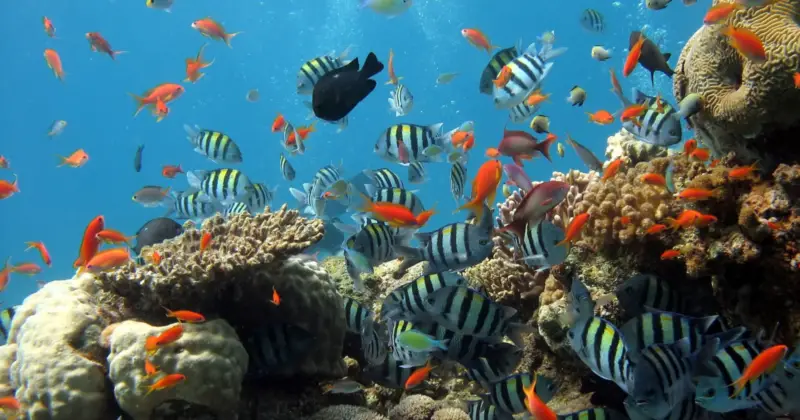
Pugs can indeed consume fish, and it is beneficial for their health. Fish provides essential nutrients such as omega-3 fatty acids, protein, vitamins, and minerals that contribute to their overall well-being. It is important to introduce fish into their diet cautiously, making sure to pick the right type of fish.
Shorter-lived fish species are generally preferable for dogs. These include salmon, walleye, trout, herring, and flounder.
Incorporating Fish in Pug Diet
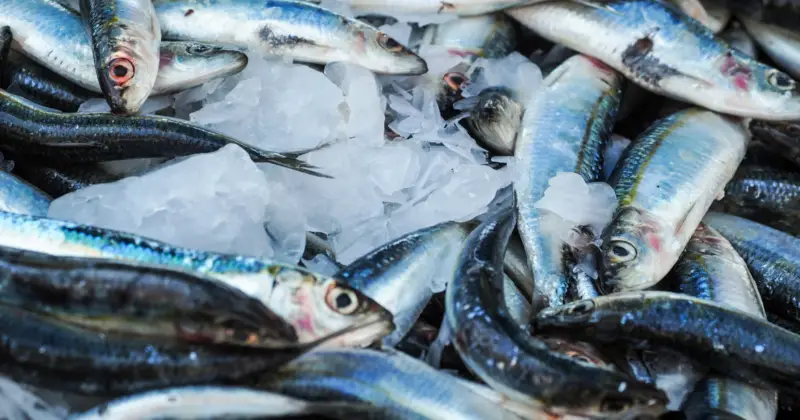
Fish can be a healthy addition to a pug’s diet due to its nutritional benefits. It is an excellent source of protein, omega-3 fatty acids, and various essential vitamins and minerals. When selecting the appropriate fish for your pug, opt for shorter-lived species like salmon, walleye, trout, herring, flounder, whitefish, and Atlantic char, as they are considered to be the most beneficial for dogs.
You can choose to offer fish to your pug in various forms, such as wet or dry dog food containing fish as the main ingredient. Many high-quality dog food brands offer fish-based recipes catering to pugs’ nutritional requirements. Alternatively, you may also prepare home-cooked meals using fish, ensuring they are thoroughly cooked, bone-free, and seasoned without harmful additives.
Moderation is key if you decide to add fish to your pug’s regular diet. As with any dietary change, introduce it gradually to avoid upsetting your pug’s stomach. It is best to serve fish as an occasional treat or a supplement to their primary dog food rather than replacing their entire diet with fish. Moreover, always consult with your veterinarian before making any significant changes to your pug’s diet for professional advice based on your pet’s specific needs.
In conclusion, incorporating fish into a pug’s diet can be both safe and beneficial, provided that it is done in moderation and with the right choice of fish. By considering the various dog food options and home-cooked meal preparations available, you can provide your pug with a nutritious and delicious source of essential nutrients.
Other Safe Foods for Pugs

In addition to fish like salmon, walleye, and trout, there are plenty of other healthy foods that pugs can enjoy. Incorporating fruits, vegetables, and snacks into their diet can be beneficial for their overall health. As always, moderation is key, and it is essential to consult your veterinarian if you intend to make significant changes to your pug’s diet.
Pugs can safely consume meat like chicken and beef, which are great sources of protein. Meals containing raw meat can be combined with shredded bones, forming a nutritious meal similar to a “steak and potatoes” combo.
For a convenient alternative, dry dog food specially designed for smaller dogs can be an excellent choice, as it contains the right amount of calories and fat without harming the teeth.
Many fruits are also suitable and healthy choices for pugs. Fruits like berries and bananas are packed with vitamins and can serve as delicious treats. In addition, pugs can enjoy mangoes and oranges in moderation. Always remember to remove seeds and peels, as these can pose a choking hazard or contain toxins.
Vegetables are another excellent option for pugs, as they provide essential vitamins and nutrients. Carrots, in particular, are a crunchy snack that can help improve dental health. Other vegetables, such as green beans and peas, can be added to their regular meals to increase variety and nutrition.
Lastly, eggs can also be safely consumed by pugs. They are a high-quality protein source that can be served scrambled or boiled and make for a nutritious snack.
Remember to avoid toxic or harmful foods to pugs, like avocados and grapes. Always consult with your veterinarian before introducing new foods to your pug’s diet, and monitor for any adverse reactions or food sensitivities.
Foods Pugs Should Avoid
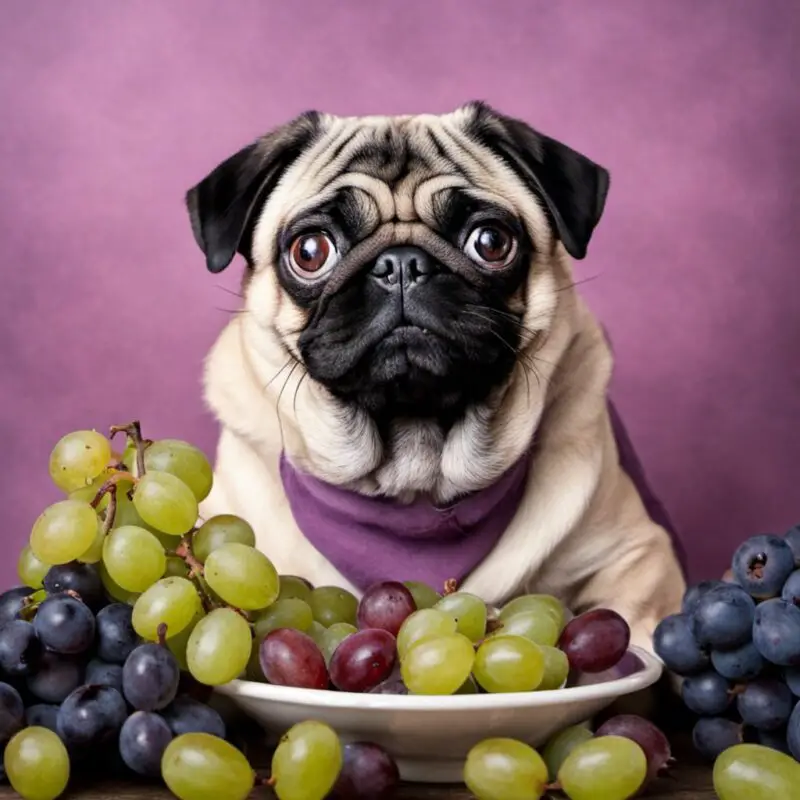
While pugs can enjoy a variety of foods, there are certain types that can be harmful to their health. Some common examples of these dangerous foods include grapes, cherries, avocados, green tomatoes, raw fish, caffeine, macadamia nuts, and raw potatoes.
Grapes and cherries can be toxic to dogs, causing kidney damage and gastrointestinal distress. It is essential to keep pugs away from these fruits.
Avocados contain persin, a compound that can cause vomiting and diarrhea in dogs. Additionally, the large seed poses a choking hazard for small dogs like pugs.
Green tomatoes contain solanine, a toxic chemical that can lead to vomiting, diarrhea, and tremors in dogs. Ripe tomatoes are safe in moderation, but unripe green tomatoes should be avoided.
Feeding raw fish to pugs can put them at risk of parasites and bacterial infections. It’s best to stick to cooked fish, like salmon, walleye, trout, herring, flounder, whitefish, and Atlantic char, which are beneficial for their health.
Caffeine is harmful to dogs, as it can cause fast breathing, tremors, and even seizures. Ensure pugs cannot access coffee, tea, or other caffeine-containing items.
Macadamia nuts can be dangerous for dogs, causing weakness, tremors, and hyperthermia. Always keep these nuts out of your pug’s reach.
Lastly, raw potatoes contain solanine, the same toxic chemical found in green tomatoes. It is best to cook potatoes thoroughly before feeding them to your pug. Remember to avoid adding any additional seasonings or toppings that could be harmful.
Being cautious with food choices and avoiding these hazardous items can help ensure your pug stays healthy and happy.
Potential Health Issues from Inappropriate Diet
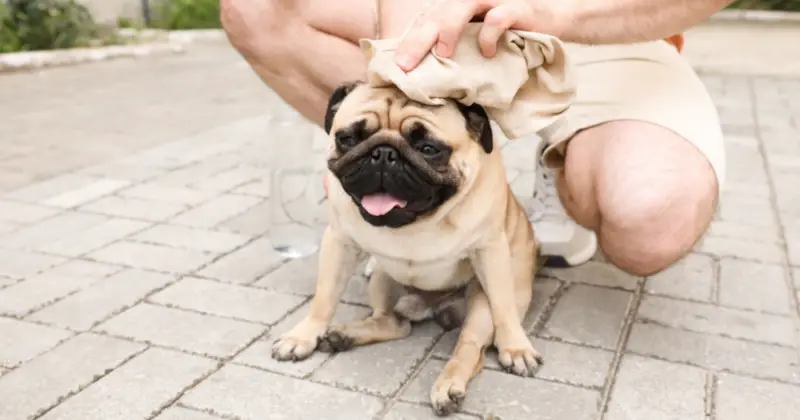
An inappropriate diet can lead to several health issues for your pug, including obesity, vomiting, diarrhea, allergies, and even pancreatitis.
Obesity is a common problem in pugs, as they have small, compact bodies and can easily gain weight if they consume too many calories or unhealthy foods. A diet high in unhealthy fats, sugars, and simple carbohydrates can contribute to excessive weight gain, which in turn can exacerbate health issues, such as joint pain, heart disease, and respiratory problems.
Vomiting and diarrhea can be a result of feeding pugs the wrong type of foods or ingredients that their stomachs cannot tolerate. Fish can be a healthy and safe addition to a pug’s diet when cooked and prepared properly, but feeding raw fish, bones, or high-mercury species can lead to gastrointestinal upset and potentially more serious health complications.
Allergies are another concern when it comes to pugs’ diets, as they can develop sensitivities to certain proteins or food ingredients. Introducing fish into a pug’s diet gradually and closely monitoring for any signs of allergic reactions will help you determine whether your pug can tolerate and benefit from fish in their meals.
Pancreatitis is a painful and potentially life-threatening condition caused by inflammation of the pancreas. High-fat diets are a common culprit, so ensuring that the fish you feed your pug is low in fat and prepared without added oils or fatty seasonings is important. Symptoms of pancreatitis in pugs can include vomiting, diarrhea, lethargy, and a hunched-over appearance.
In conclusion, incorporating fish into a pug’s diet can provide various health benefits, but it’s essential to do so with caution and consideration for their unique dietary needs and potential health risks. Always consult with a veterinarian before making any significant changes to your pug’s diet, and closely monitor them for any signs of adverse reactions or health issues.
Frequently Asked Questions: Can Pugs Eat Fish

Is it safe for pugs to consume fish?
Yes, it is generally safe for pugs to consume fish. Feeding your pug fish can offer many benefits, such as providing them with essential nutrients like omega-3 fatty acids, which help maintain a healthy skin, coat, and immune system. However, it is important to choose the right type of fish and to prepare it properly to ensure your pug’s safety.
Are there specific fish types that pugs should avoid?
Pugs should avoid consuming fish with high levels of mercury, such as tuna, swordfish, and king mackerel. Instead, opt for short-lived fish, like sardines and whitefish, which have lower levels of mercury and are generally safer for your dog.
What is the best way to prepare fish for pugs?
The best way to prepare fish for pugs is to cook it through baking, broiling, or steaming. Cooking the fish will kill any potential parasites or harmful bacteria. Make sure to remove all bones before serving, as they can be a choking hazard or cause internal injury.
Can pugs eat fish bones or heads?
No, pugs should not eat fish bones or heads. Fish bones can be very sharp and may cause choking or puncture the digestive tract. It’s best to remove all bones from the fish before feeding it to your pug to ensure their safety.
Is raw fish a suitable option for pugs?
Raw fish is not recommended for pugs, as it may contain parasites or harmful bacteria that can cause illness. It’s best to cook the fish before feeding it to your pug to ensure it is safe for consumption.
Are there any risks in feeding pugs seafood like shrimp?
Feeding your pug seafood like shrimp is generally safe, but it’s best to offer it as an occasional treat and to cook the shrimp before feeding it to your pet. Keep in mind that some pugs may have a seafood allergy, so it’s important to monitor your pug for any signs of an allergic reaction, such as itching, vomiting, or diarrhea, after consuming shrimp or other seafood.

